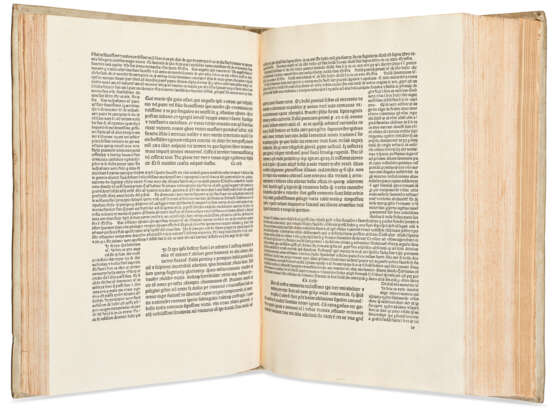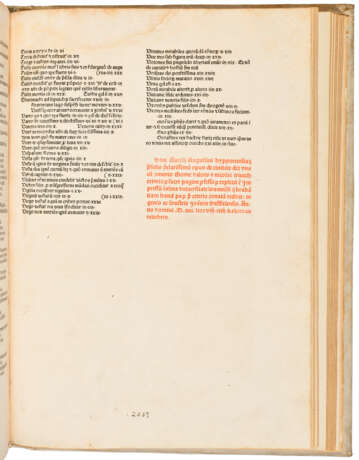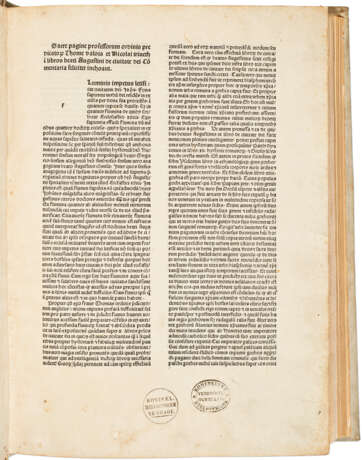ID 1236241
Lot 11 | Saint Augustine's De civitate Dei
Estimate value
$ 20 000 – 40 000
The only Louvain edition of Saint Augustine’s magnum opus. Augustine, a native of North Africa, played a pivotal role in the development of theology in the Latin-speaking world. In the Middle Ages, “the writings of Augustine represented the most solid body of philosophical and theological ideas then available in Latin" (Kristeller). His works were central to the transmission of Platonic philosophy and “both Luther and Calvin took Augustine as the foundation of Protestantism next to the Bible itself” (PMM). This, his greatest work, was written in the wake of the fall of Rome, contrasting the fallible and frangible world of empire with the enduring eternity of the city of God.
This surrounding commentary by the thirteenth-century Dominicans Nicholaus Trivet and Thomas Waleys was often printed with the text. Johann of Westphalia was one of the first printers in Flanders and the first at Louvain, where he printed for the university from 1474 until 1496. HC 2061 = 2069; C 759; BMC IX 144; GW 2886; CIBN A-686; Bod-Inc A-528; Goff A-1242; ISTC ia01242000. See PMM xx and Paul Oskar Kristeller, Renaissance Thought and Its Sources (1979).
Royal folio (369 x 265mm). 300 leaves. Colophon printed in red. (Some leaves a little soiled around the edges, some dampstaining worse in the middle, a few small marginal chips and tears.) 18th-century Dutch blind-stamped vellum, paper index tabs marking beginning of books (remboîtage with later endpapers and 10 gatherings of blank leaves bound in at end, rear hinge cracked, final gathering [of blank leaves] sprung). Provenance: scattered marginal comments and underlining, including some notes on blank leaves in various hands at various times, with lines from Augustine's text copied out in an early script (sometimes trimmed) – Johann, priest of St Wilhelm’s (inscription dated 1523) – Thisbe Lappius (?, bibliographical note to endpaper) – Koninklijke Bibliotheek, The Hague (ownership and duplicate release stamps on first text leaf) – George Merle Zacharias, 1858-1910, minister (bookplate noting donation to:) – current consingor (bookplate and blindstamps).
| Artist: | Augustine of Hippo (354 - 430) |
|---|---|
| Genre: | Religious genre |
| Place of origin: | Belgium |
| Auction house category: | Antiquarian books, Printed books |
| Artist: | Augustine of Hippo (354 - 430) |
|---|---|
| Genre: | Religious genre |
| Place of origin: | Belgium |
| Auction house category: | Antiquarian books, Printed books |
| Address of auction |
CHRISTIE'S 8 King Street, St. James's SW1Y 6QT London United Kingdom | |
|---|---|---|
| Preview |
| |
| Phone | +44 (0)20 7839 9060 | |
| Buyer Premium | see on Website | |
| Conditions of purchase | Conditions of purchase |












